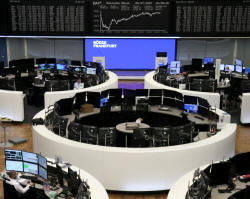Oil nears three-year high after OPEC fireworks
 Send a link to a friend
Send a link to a friend
 [July 06, 2021] By
Marc Jones [July 06, 2021] By
Marc Jones
LONDON (Reuters) - Oil prices were heading
towards three-year highs on Tuesday, towing petrocurrencies and
inflation expectations with them, after the world's main oil producers
failed to agree on production plans.
Wall Street was facing a groggy restart after its July 4 holiday,
Europe's equity markets were spluttering at the prospect of higher
inflation and China spooked its tech sector again with another
high-profile clampdown [.SS].
The main action was around the black stuff, though, after the
Organization of the Petroleum Exporting Countries (OPEC) and its allies,
a group known as OPEC+, abandoned talks after the United Arab Emirates
rejected a proposed eight-month extension to output curbs. [O/R]
Some OPEC+ sources said there would be no oil output increase in August,
while others said a new meeting would take place in the coming days and
they believed there would be a boost in August.
Crude traders were not hanging around to find out. They pushed Brent up
as far as $77.66 - the highest level since October 2018 - and U.S. crude
to its highest since late 2014 at $76.90 a barrel. Oil is up roughly 50%
this year and over 385% since last year's COVID-driven slump.

"Without an injection of some extra barrels of oil in the coming weeks,
given the tightness of the market, Brent might cross the USD 80/bbl
threshold," UniCredit's analysts said.
The main petrocurrencies loved it.
Norway's crown, the Canadian dollar and Russia's rouble all rose. The
Australian and New Zealand dollars climbed too as the Aussie central
bank pared back stimulus, although like many of its peers it did its
best to dampen interest rate rise talk.
Back in Europe's stock markets, the oil sector had made the early
running, rising as much as 0.5% as the region's STOXX 600 sagged 0.2%.
[.EU]
"Slowing growth, rising inflation and less expansive monetary policy
could act as a dampener on equity markets and riskier corporate bonds,"
Pictet Asset Management's chief strategist Luca Paolini said.
Graphic: Oil prices and global inflation -
https://fingfx.thomsonreuters.com/
gfx/mkt/dgkvlrjorvb/Pasted%20image%201625556400903.png
TECH PROBLEMS
Overnight in Asia, MSCI's broadest index of Asia-Pacific shares outside
Japan inched up 0.1% late on, having spent the session in and out of the
red.
Japan's Nikkei finished up 0.2% but Australia's S&P ASX200 reversed
following the RBA's decision to keep interest rates on hold.
[to top of second column] |

The German share price index DAX graph is pictured at the stock
exchange in Frankfurt, Germany, July 5, 2021. REUTERS/Staff/Files

Hong Kong marked its sixth day of losses and China's CSI300 dipped to an
almost two-month-low [.SS], after the Cyberspace Administration of China
ordered an investigation into ride-hailing giant Didi, days after it
listed on the New York Stock Exchange.
China will step up supervision of Chinese firms listed offshore, and
improve regulation of cross-border data flow and data security, Xinhua
news agency quoted the cabinet as saying.
In pre-U.S. market trading Didi's shares, which had been valued at up to
$75 billion as of Friday, were down 25%.
"There is still lingering uncertainty from China's tech companies and
they are prominent in the Asian market, so that could be a cloud for
market sentiment," said Tai Hui, JPMorgan Asset Management's chief Asia
market strategist.
"The tech sector is very significant in Asia and we are not going to
have a lot of clarity on the regulatory adjustments in China for the
next few weeks or even months and (that) will be an important driver for
the market."
Investor appetite for Chinese tech companies could be tested by Xiaomi
mandating 12 banks on Tuesday to lead a potential U.S. dollar debt
issuance.
Globally, the publication of the U.S. Federal Reserve's Federal Open
Markets Committee minutes for June on Wednesday is highly anticipated by
investors for guidance on whether emergency stimulus measures could
start to be tapered.
Back in Europe, data showed euro zone monthly retail sales rose more
than expected in May although investor sentiment in Germany saw a modest
drop.

The rise in oil, however, meant a key market gauge of long-term euro
zone inflation expectations rose above 1.62% for first time in seven
weeks.
(Additional reporting by Scott Murdoch in Singapore; Editing by Alison
Williams and John Stonestreet)
[© 2021 Thomson Reuters. All rights
reserved.] Copyright 2021 Reuters. All rights reserved. This material may not be published,
broadcast, rewritten or redistributed.
Thompson Reuters is solely responsible for this content. |